How to Update Outdated Laravel Coding Practices?
Develop a cutting-edge Laravel application by implementing updated Laravel coding practices. Find out here!
Summary
Updating outdated Laravel coding practices is essential for maintaining a secure, efficient, and scalable application. Here are a few critical tips to update your coding practices:
Upgrade to the latest Laravel version
Adopt Laravel best practices
Utilize composer for dependency management
Implement automated testing
By systematically updating your Laravel coding practices and staying abreast of the latest Laravel features and community best practices, you can ensure that your web applications remain robust, secure, and easy to maintain.
Introduction
In the ever-evolving landscape of web development, keeping your Laravel application up-to-date is crucial for maintaining performance, security, and a competitive edge. Failure to do this can adversely affect your business.
Laravel, a popular PHP framework for web development, has seen significant evolution over the years. It has rapidly risen to popularity in quick time, making it one of the most popular PHP frameworks.
Keeping up with these changes is crucial for maintaining efficient, secure, and scalable applications. Here's a comprehensive guide to efficiently update your outdated Laravel coding practices.
This article aims to provide developers and teams with actionable strategies to modernize their coding practices. It covers everything from adopting new features and Laravel best practices, to refactoring legacy code. It also includes leveraging the Laravel ecosystem's full potential.
Importance to Update Coding Practices
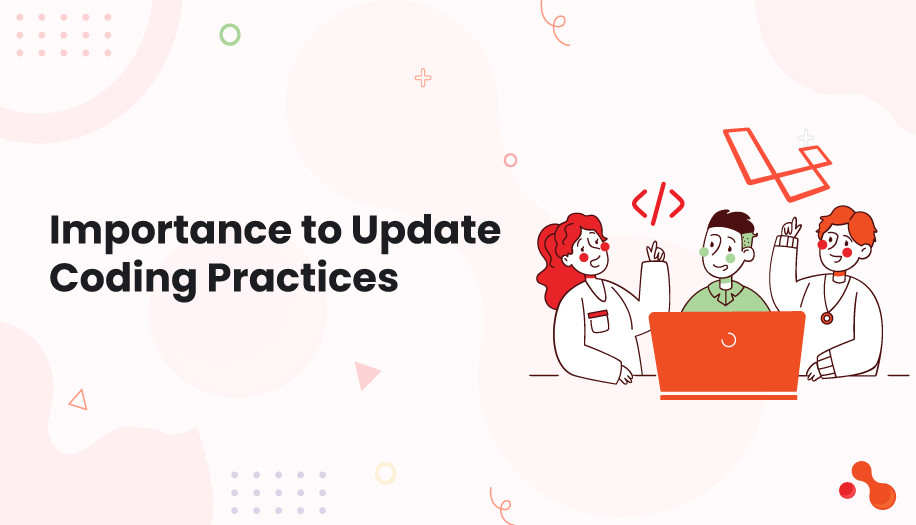
The first step in updating your Laravel coding practices is recognizing the need for change. Outdated practices can lead to slower development times, security vulnerabilities, and difficulties in maintaining and scaling your application.
The Laravel community is active and continuously evolving.. We have new versions offering better performance, better security features, and more efficient ways to write code. Updating outdated coding practices is essential for maintaining a robust, secure, and efficient application.
As Laravel continues to evolve, adopting modern practices can significantly enhance your project's maintainability, performance, and scalability.
Addressing and updating outdated coding practices is crucial for several reasons. Outdated practices can lead to vulnerabilities, inefficiencies, and obstacles that hinder your project's growth and adaptability. Here's why keeping your Laravel coding practices up to date is important:
Security Vulnerabilities & Compliance
Performance & Efficiency
Modern Techniques & Maintainability
Code Quality & Deprecation
Scalability, Future Growth & Integration Flexibility
Community Support and Resources, Support Availability & Package Compatibility
Developer Productivity and Satisfaction
Competitive Advantage & Innovation
Market Response
Real-World Examples
Here are a few real-world examples of outdated coding practices to better understand the need to update.
Solely relying on manual testing without automated tests. In the past, manual testing might have been the primary method, but now, automated unit, integration, and UI tests are essential for continuous integration and delivery pipelines.
Not utilizing modern frameworks or libraries. Continuing to write vanilla JavaScript for common tasks instead of using modern libraries and frameworks (like React, Vue, or Angular) that offer optimized, maintainable, and scalable codebases.
Not using policies for authorization in Laravel. The old practice is to implement authorization logic directly in controllers or routes, which scatters business logic and makes it hard to manage. But the modern approach is to use Laravel's policies to handle authorization logic in a more organized and manageable way, keeping controllers clean and focusing on business logic.
Checklist Update Outdated Laravel Coding Practices
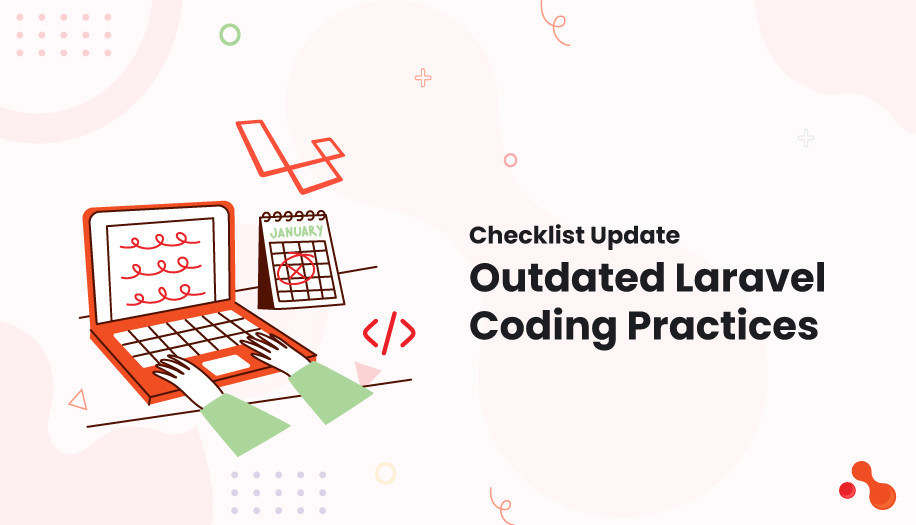
The latest version of Laravel as of April 2024 is Laravel 11. Version 11 brings many new features and improvements. This version also deprecates several features, making it necessary to update. Besides this, coding practices also need updating with updates in technology and in keeping with the evolving requirements.
Here is a checklist to update coding practices:
Review official Laravel documentation.
Update code dependencies.
Process deprecated features.
Perform automated testing.
Update custom code and features.
Optimize the performance of the application.
Perform a compatibility test.
Update relevant documents & guides.
Tips To Update Coding Practices
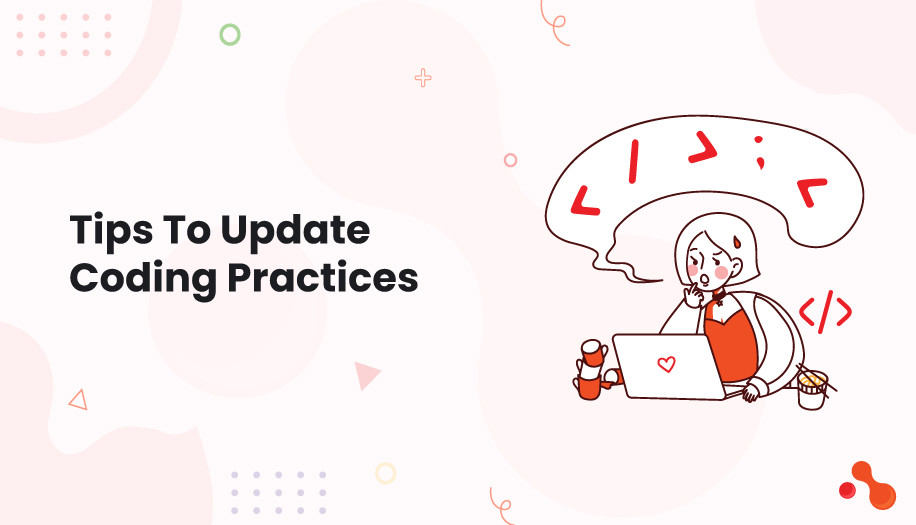
Assess Your Current Laravel Version: Before diving into updates, assess the version of Laravel your application is currently using. An outdated Laravel version can miss out on security patches, new features, and performance improvements.
Regularly Check for Updates: Stay informed about the latest Laravel releases and security advisories. This proactive approach ensures you're aware of new features and critical fixes that can enhance your application.
Compatibility Analysis: Conduct a thorough analysis to ensure your application's compatibility with the latest Laravel version. This step is vital to avoid breaking changes that could disrupt your application's functionality.
Backup Your Application: Always create a comprehensive backup of your application and its data before initiating any update process. This safety measure protects against data loss during the transition.
Update Dependencies: Gradually update your application's dependencies and packages to align with the latest Laravel version. This step reduces the risk of compatibility issues and ensures a smoother upgrade process.
Refactor Deprecated Code: Identify and refactor any deprecated code in your application. Using modern, supported Laravel features not only improves code quality but also prepares your application for future updates.
Automated Tools: Consider using automated tools like Laravel Shift. This can significantly streamline the upgrade process by detecting outdated, deprecated, and incompatible code within your Laravel applications.
Testing: After updating, thoroughly test your application to ensure all functionalities work as expected. Automated testing can be a time-efficient way to cover various aspects of your application.
Continuous Integration (CI): Implement a CI pipeline to automate the testing and deployment process. This practice helps in identifying issues early and ensures a consistent state of your application.
Documentation: Keep your documentation updated with the latest changes. This practice is essential for new team members. This also helps maintain a clear understanding of your application's structure and functionality.
Training and Knowledge Sharing: Ensure your development team is well-informed about the latest Laravel features and best practices. Regular training sessions can facilitate knowledge sharing and skill enhancement.
Monitor Performance: Post-update, monitor your application's performance. This is necessary to ensure your updates have a positive impact on speed and efficiency of your application.
Seek Expert Advice: If you encounter complex challenges during the update process, don't hesitate to seek advice from Laravel experts or the community. They can provide valuable insights and solutions.
Assessing Your Current Practices: Conduct a thorough review of your current Laravel codebase. Identify areas using deprecated methods, packages, or practices no longer considered best practices.
Check your application's composer.json file to identify outdated Laravel packages and third-party dependencies. Utilize Laravel's built-in tools and packages to benchmark your application's performance. Identifying bottlenecks early can guide your update strategy effectively.
Planning Your Update Strategy: Create a detailed plan for updating your Laravel application. This plan should prioritize critical updates. This includes updates like security patches, before moving on to less critical areas. Ensure your development team is up to speed with the latest Laravel features and best practices.
Consider investing in training sessions, workshops, or online courses. Develop a comprehensive testing strategy to ensure that updates do not break existing functionality. Laravel's built-in testing features, like PHPUnit for unit tests and Laravel Dusk for browser tests, can be invaluable tools.Modernizing Laravel Practices: Stay current with new Laravel releases and incorporate features that enhance productivity and performance. Features like Laravel Jetstream, Livewire, and Sanctum can significantly modernize how you build web applications.
Refactoring Legacy Code: Gradually refactor legacy code to adhere to modern Laravel practices. This includes adopting Eloquent ORM best practices, utilizing resource controllers, and leveraging advanced Blade directives.
Embracing Design Patterns: Implement design patterns that Laravel supports effectively. This includes Repository patterns for data access or Strategy patterns for defining a family of algorithms.
Leveraging Laravel Ecosystem: The Laravel ecosystem is rich with packages and tools that can accelerate development and introduce modern functionalities. Regularly explore and integrate well-supported packages that align with your application's needs.
Laravel Horizon for Queue Management: If your application relies heavily on background jobs and queues, Laravel Horizon provides a powerful dashboard and configuration system to manage these tasks more efficiently.
Automated Testing: Integrate automated testing and CI pipelines to streamline your development process. Tools like GitHub Actions, GitLab CI/CD, and Travis CI can automate testing and deployment workflows.
Improving Application Security and Performance: Regularly update Laravel and all dependencies to their latest versions to patch known vulnerabilities. Utilize Laravel's built-in security features, such as encrypted storage, CSRF protection, and secure authentication mechanisms. Implement caching strategies, optimize database queries using Laravel Eloquent, and leverage Laravel Scout for full-text search optimizations.
Community Engagement and Continuous Learning: The Laravel community is a vibrant ecosystem of developers, contributors, and enthusiasts. Participate in forums, attend Laravel conferences, and contribute to open-source projects to stay informed and connected.
Continuous Learning: The tech industry is fast-moving, and continuous learning is crucial. Keep abreast of Laravel updates, PHP advancements, and web development trends.
Is Your Laravel Code Outdated? Let Our Experts Handle It!"
Struggling with outdated Laravel code? Our certified Laravel experts can modernize your applications with the latest practices. Boost efficiency and stay ahead in the market. Tap into our expertise for seamless upgrades.
Benefits of Laravel Optimization
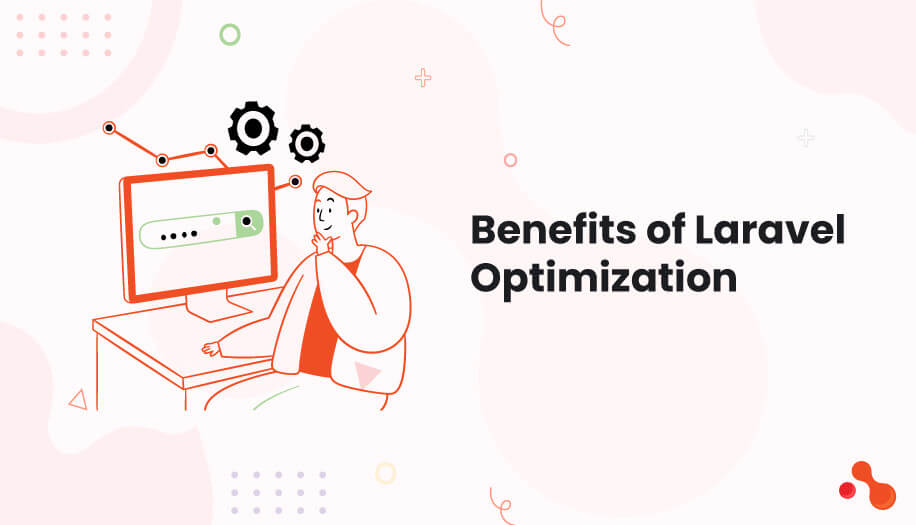
Laravel, a PHP framework known for its elegance and simplicity, offers robust tools and features for web application development. However, as with any framework, applications built on Laravel can suffer from performance issues if not properly optimized. The same issue occurs if one is using outdated coding practices.
Optimizing your Laravel application can lead to numerous benefits, directly impacting the overall success and efficiency of your project. Here are some key benefits of Laravel optimization:
Improved Application Performance
Enhanced User Experience
Scalability
Reduced Server Costs
Improved SEO Rankings
Better Security
Developer Productivity
What is the Best Time to Update?
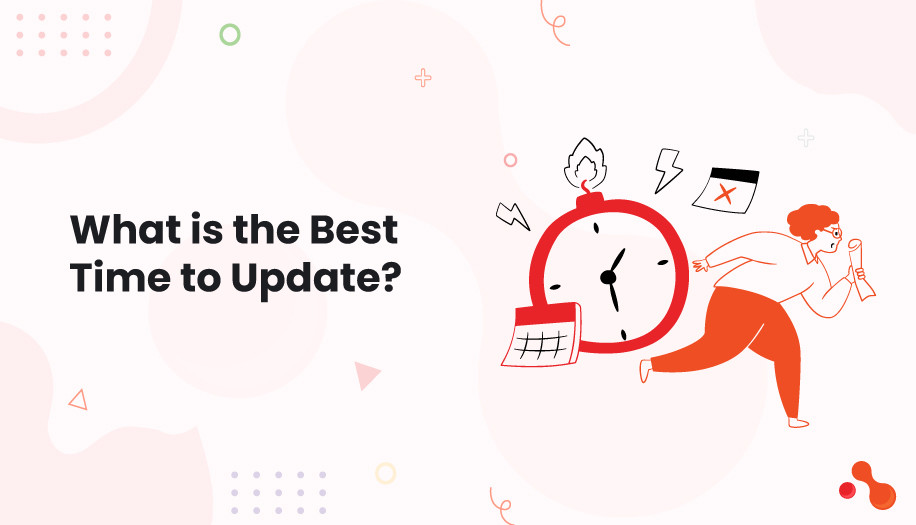
The best time to update coding practices depends on various factors, including project timelines, team capacity, and the criticality of the updates. It will work in your favor to consult the experts for this purpose like Acquaint Softtech.
We are a official laravel partner and it staff augmentation company in India. We have over ten years of experience developing top-notch solutions.
A fitting quote: “As a programmer, it is your job to put yourself out of business. What you do today can be automated tomorrow.” - Doug McIlroy
However, there are several vital scenarios when updating Laravel coding practices is particularly beneficial:
Major Version Releases: Laravel releases major versions periodically, introducing significant enhancements, optimizations, and security fixes. Planning an update shortly after a major release allows you to leverage the latest features and improvements.
Project Milestones: If you're already planning to refactor parts of your application or perform maintenance tasks, consider updating coding practices simultaneously. This helps consolidate efforts and ensures that updated practices are integrated into the refreshed codebase.
Security Vulnerabilities: If you discover security vulnerabilities in your application or dependencies, it's crucial to update your coding practices promptly. This helps address these vulnerabilities and protect your application from exploitation.
When Performance Bottlenecks Are Identified: If performance benchmarks reveal bottlenecks or inefficiencies in your application, update coding practices. Ensure you utilize modern optimization techniques that can improve performance and scalability.
Team Availability and Capacity: Consider updating coding practices during periods of low development activity or downtime to minimize disruption to ongoing projects. This allows your team to focus on updating practices without competing priorities.
Scheduled Maintenance Windows: If your application has scheduled maintenance windows for updates and patches, consider incorporating updates to coding practices into these maintenance windows to ensure minimal downtime and disruption.
Strategic Planning: As part of strategic Planning initiatives, incorporate updates to coding practices into your strategic planning initiatives. Also align them with long-term goals and objectives for your application's development and maintenance.
As part of Continuous Improvement Processes: Emphasize the importance of continuous improvement in your development process, regularly evaluating and updating coding practices to incorporate industry best practices and emerging trends.
Trust the official Laravel Partners to develop a robust software solution for your business. Get in touch with us and gain the upper edge.
Conclusion
Ultimately, the best time to update Laravel coding practices is when it aligns with your project's priorities, timelines, and strategic objectives. Stay proactive and responsive to updates to ensure that your application remains secure, performant, and maintainable.
Leveraging the latest features and optimizations offered by the Laravel framework. Hire laravel developers to take advantage of their expertise.
FAQ: How to Update Outdated Laravel Coding Practices?
-
Why is it important to update outdated Laravel coding practices?
Updating outdated Laravel coding practices is crucial for enhancing application performance, security, and maintainability. It ensures your project takes advantage of the latest features, improvements, and security patches offered by Laravel.
-
Are there any tools that can help with updating outdated Laravel practices?
Yes, tools like Laravel Shift, PHPStan, and Larastan can help automate and identify areas for improvement. PHPUnit and Laravel Dusk are great for automated testing.
-
How often should I review and update my Laravel coding practices?
Regularly review and update your practices with each new Laravel release or at least once a year. Staying updated with the latest version is key to leveraging improvements and maintaining optimal security.
-
Can updating outdated Laravel practices improve application security?
Absolutely. Updating practices and upgrading to the latest Laravel versions can significantly enhance application security by addressing vulnerabilities and implementing the latest security features.
-
How does updating Laravel coding practices impact team productivity?
Updating coding practices can initially require a time investment but ultimately leads to increased productivity. Modern practices and tools streamline development, reduce bugs, and improve team collaboration.
Table of Contents
Get Started with Acquaint Softtech
- 13+ Years Delivering Software Excellence
- 1300+ Projects Delivered With Precision
- Official Laravel & Laravel News Partner
- Official Statamic Partner

